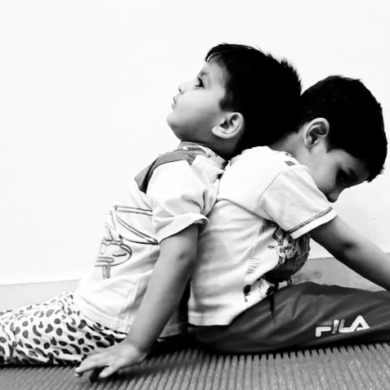In the earlier years man suffered stress. They were probably afraid of attack by wild animals, or dying of hunger or cold. The reaction was simple –‘Fight or Flight’. Unfortunately, in today’s times life is not as simple. Today, the stress situations are either too complex like crash of stock market, environmental pollution, threat of nuclear war or these situations are too mundane to be overlooked like traffic jams, misplacing car keys, foul-ups at work, concern about weight gain and the list goes on. In this sense people are often seen as passive helpless victims of the stress phenomenon.

In Yoga, causes of ill health are considered as imbalance of mind and body. Our own thoughts can create distress in not just us but also in people around us. Yoga considers even distress or discomfort as an illness. Hence, Yogic viewpoint of disease appears to progress through four distinct phases.
- Psychic Phase – this phase is marked by mild but persistent psychological and behavioral symptoms of stress like irritability, disturbed sleep and other minor symptoms.
- Psychosomatic phase – If the stress continues there is an increase in symptoms, along with the appearance of generalized physiological symptoms such as occasional high BP, tiredness without specific cause, etc.
- Somatic Phase – This phase is marked by disturbed function of organs, particularly the target organ, such as now the person suffers from hypertension. At this stage one begins to identify with the diseased state.
- Organic Phase – This phase is marked by full manifestation of the diseased state, with pathological changes such as enlarged heart with their resultant complications.
Yoga as therapy works wonders in the first two phases to the extent of reversing the illnesses. In the somatic phase one may already be on other methods of treatment. But even here Yoga as a complimentary therapy brings remarkable results. Provided one is consistent in his practice, it’s not unusual to see reduced to no medication over a period of time. In the final stage, Yoga has a palliative and quality of life improving effect. Even in terminal and end of life situations, Yoga produces positive emotional and psychological effects.
In our busy lives often the early stages of illness is overlooked and the final stage is seen as an entity unto itself, having little relationship to ones living habits and patterns. One needs to take stock of his health NOW. Just as we save money in a bank to tide over financial crises, so also we need to build up our positive health balance to help us manage unforeseen health challenges with faster recovery and recuperation.
Having said the above, Yoga understands that physical ailments that are not of psychosomatic in nature may need intervention of surgery, medication, prayers and other lifestyle modifications as required.




Add Comment